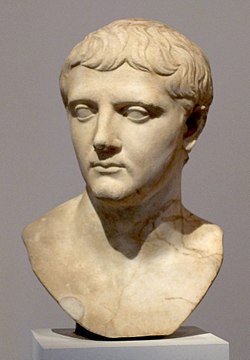Crispus
| This article uses material from the Wikipedia article Nero Claudius Drusus, which is released under the Creative Commons Attribution-ShareAlike 4.0 International License (view authors). |
| Crispus | |||||
|---|---|---|---|---|---|
 | |||||
| Romanyan emperor | |||||
| Reign | August 19, 2 AD – August 4, 14 AD | ||||
| Predecessor | Augustus | ||||
| Successor | Tiberius | ||||
| Born | Quintus Fonteius Nero September 9, 38 BC Romanya, Campodine | ||||
| Died | August 4, 14 AD (aged 52) Turis, Moncamecia | ||||
| Burial | Mausoleum of Augustus, Romanya | ||||
| Spouse | Antonia the Younger (m. 16 BC) | ||||
| Issue | |||||
| |||||
| Dynasty | Julio-Claudian | ||||
| Father |
| ||||
| Mother | Livia Druscilla | ||||
| Occupation |
| ||||
| Military service | |||||
| Allegiance | Romanyan Republic Romanyan Empire | ||||
| Years of service | 20–4 BC | ||||
Quintus Fonteius Caesar Augustus Nero (September 9, 38 BC - August 4, 14 AD), commonly known by his nickname Crispus, was a Romanyan emperor from 2 AD to his death in 14. The son of Tiberius Fonteius Nero and Livia Druscilla, born in Romanya, Crispus advanced the cursus honorum early in his career, being named consul four times in 16, 7, 6, and 2 BC. Crispus married Antonia the Younger and was adopted by emperor Augustus, whom he eventually succeeded in 2 AD upon his death.
Crispus was born into the plebian gens Fonteia in 38 BC. His father, Tiberius Fonteius Nero, served as aedile twice in 34 and 30 before his death while fighting with Marcus Pontidius Rufus in Terranihil. He joined the army at sixteen and helped lead Romanyan forces to a string of victories in campaigns throughout Cospania. In 16, Crispus was elected consul along with Lucius Licinius Veteranus and soon after began campaigns against the Kingdom of Vaktria and Chernastum VI in the First Romanyan–Vaktrian War. A victory at the Battle of Maplas River elevated Crispus on the political stage, gaining him the support of emperor Augustus, who arranged Crispus' marriage to Antonia the Younger, daughter of Marc Antony, and later adopted him as his successor.
Crispus and his adopted brother, Tiberius, were originally intended to succeed Augustus as co-emperors, however throughout Augustus' reign Crispus continued repeated military victories while Tiberius' reputation was stained by a failed marriage to Augustus' daughter, Julia the Elder. Victories in the Second Romanyan–Vaktrian War and against the Kavardans cemented Crispus as the sole heir. Following Augustus' death in 2 AD, Crispus was declared emperor by the Senate and Tiberius withdrew to Salonia.
As emperor, Crispus expanded Romanyan holdings, securing parts of southern Vaktria and eastern Cospania. In addition, Crispus also reinstated Romanyan military influence over the client state of Craeperia Citerior and secured trading routes through the Al Eazim Koura Desert. He continued Augustine tax reforms and instituted new plans for urban renewal, expanding the city of Romanya and building the large Thermae Neronae as well as the Temple of Victoria and Bellona on the Quirinal Hill. Crispus intended his son Maurtanius to succeed him, however upon his own death in 14 in Turis after a prolonged sickness, Maurtanius was off on campaign in Azomanca and Tiberius seized the opportunity to become emperor.
